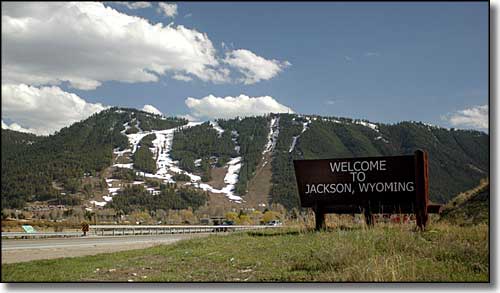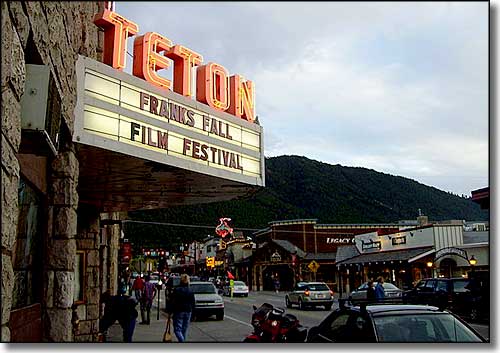
Jackson, Wyoming

Millions of tourists pass through Jackson every year on their way to Grand Teton National Park, the National Elk Refuge and Yellowstone National Park. A lot of folks also come to ski the slopes at Snow King Resort, Jackson Hole Mountain Resort and at the nearby Grand Targhee Resort. Jackson is the town, Jackson Hole is the valley the town sits in.
The valley of Jackson Hole was inhabited for centuries by the Crow, Shoshoni, Bannock, Blackfeet and Gros Ventre tribes of Native Americans. John Colter, a former member of the Lewis & Clark expedition, was the first European to enter the valley during the winter of 1807-1808 (after Lewis & Clark had returned to the east). His stories of the valley brought in many mountain men and trappers within a few years. David Jackson, an early partner in what became the Rocky Mountain Fur Company, left his name on Jackson, Jackson Hole and Jackson Lake.
William Henry Jackson arrived in Jackson Hole with the Hayden Expedition of 1871-1872. It was his photos of the Yellowstone area that convinced Congress to declare Yellowstone the first national park in 1872. The Grand Tetons became a national park in 1920 which was expanded in 1950 after John D. Rockefeller bought and then donated some 30,000 acres of land to the park (that's why the John D. Rockefeller Memorial Highway connecting Grand Teton with Yellowstone).
Jackson was a small, unnamed settlement until 1894. Some of those very first buildings still survive in the area around the Town Square. It's around Town Square that you'll come across those 4 famous elk-antler arches. While Wyoming was probably the first state to give women the right to vote, Jackson actually elected one of the first all-woman city councils in America in 1920.
Of the 2,697,000 acres in Teton County, less than 3% is in private hands... With its limited growing season, the climate in Jackson Hole is pretty inhospitable. Homesteaders came and tried after the 1862 Homestead Act was passed but most didn't last too long. The local mountains came up a bit short in terms of precious minerals but the remoteness of the area did mean quite a few outlaws, poachers, elk tuskers and horse thieves would congregate here. Over time, the area got a name for big game hunting and sport fishing, then skiing developed, the national parks got famous, tourism flourished and that all led to the Jackson we see today.

In downtown Jackson
Zip Codes: 83001, 83002, 83025
Latitude: 43.4754°N
Longitude: 110.7692°W
Founded: 1894
Elevation: 6,237'
Education:
High School or Higher: 92.3%
Bachelor's Degree or Higher: 36.7%
Graduate or Professional Degree: 9.4%
2011 Cost of Living Index for Jackson: 102.2
Estimated Median Household Income: $58,780
Estimated Median Home Value: $626,900
Median Resident Age: 30.8 Years
Major Industries:
Lodging & Food Services, Construction, Health Care, Educational Services, Professional Services, Real Estate Services, Finance & Insurance Services, Outfitters, Waste Management Services, Arts & Entertainment
Unemployed (March 2011): 7.1%
Population Demographics: 2010
| Total Population | 9,577 |
| Males | 5,185 |
| Females | 4,392 |
| Population by Age | |
| Under 18 | 1,720 |
| 18 & over | 7,857 |
| 20-24 | 969 |
| 25-34 | 2,602 |
| 35-49 | 2,203 |
| 50-64 | 1,346 |
| 65 & over | 590 |
| Population by Ethnicity | |
| Hispanic or Latino | 2,607 |
| Non Hispanic or Latino | 6,970 |
| Population by Race | |
| White | 7,645 |
| African-American | 35 |
| Asian | 138 |
| Native American | 78 |
| Hawaiian or Pacific Islander | 12 |
| Other | 1,451 |
| Two or more | 218 |
Grand Targhee Ski Resort - Bridger-Teton National Forest
Yellowstone National Park - Grand Teton National Park - National Elk Refuge
Jedediah Smith Wilderness - Gros Ventre Wilderness - Teton Wilderness
Winegar Hole Wilderness - Wyoming Centennial Scenic Byway
